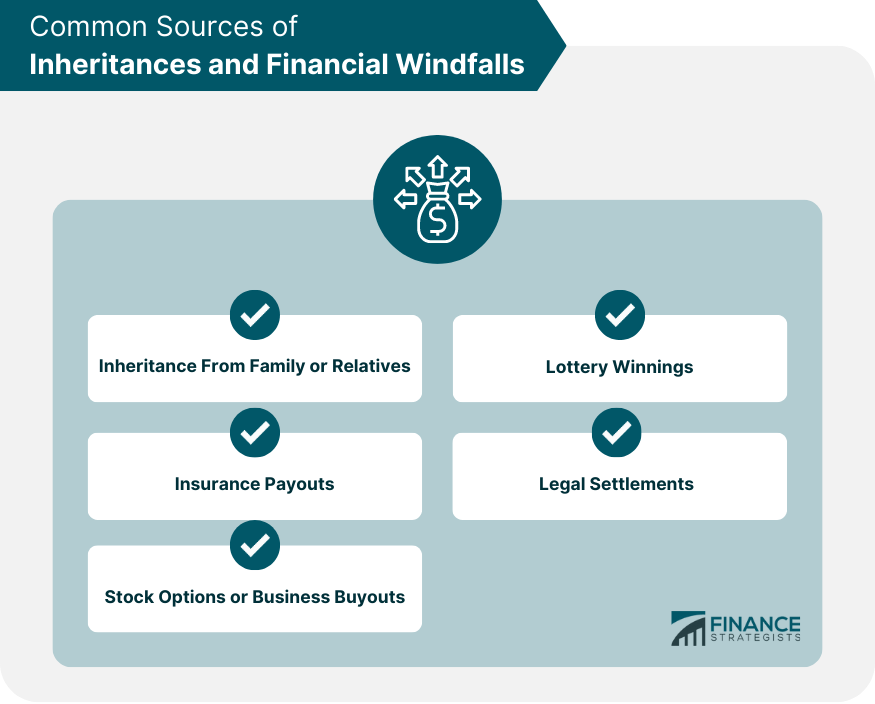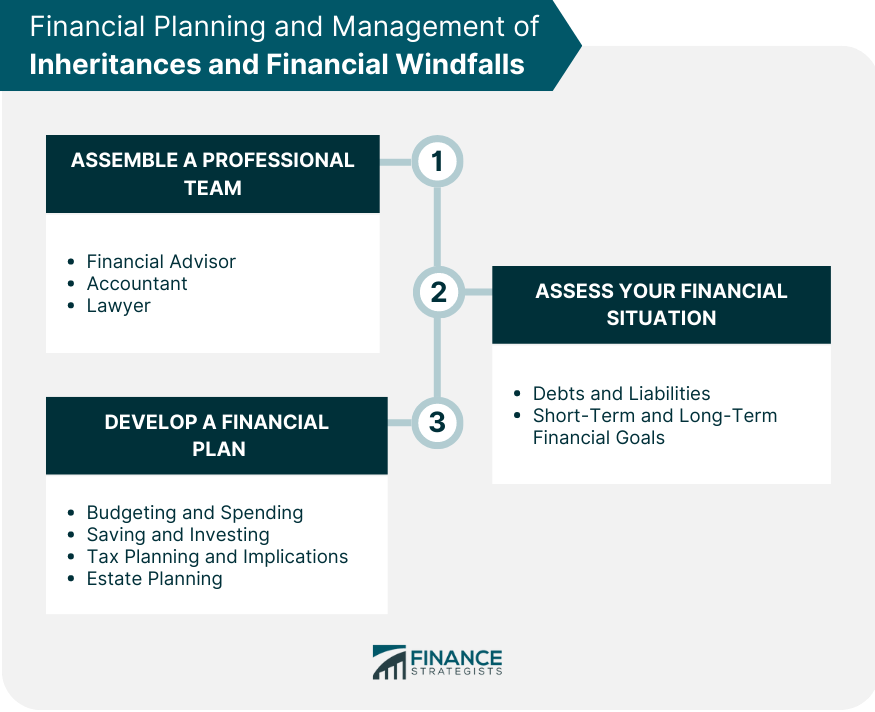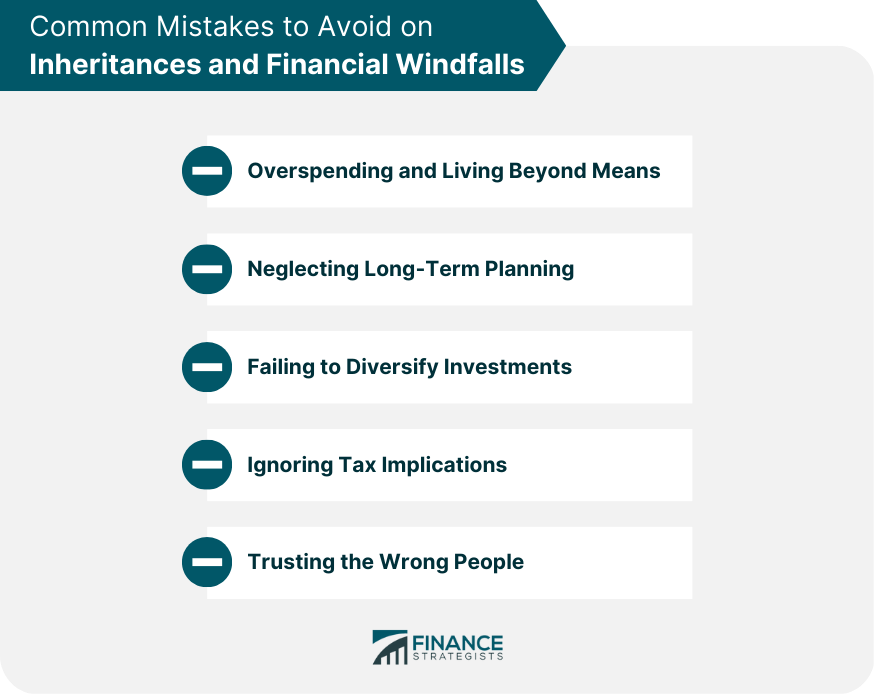Inheritances and financial windfalls refer to unexpected wealth, often coming from sources such as deceased family members or sudden gains, such as lottery winnings. The importance of managing unexpected wealth cannot be overstated, as it can significantly impact one's financial stability and future security. Inheritance is the most common form of financial windfall, involving the transfer of assets from a deceased family member or relative. It may include cash, property, or other valuables that can significantly increase one's net worth. Lottery winnings are another source of unexpected wealth, where individuals win large sums of money through games of chance. While the probability of winning is low, the potential for significant financial gain exists. Insurance payouts occur when an individual receives a lump-sum payment from an insurance policy, often due to a significant life event or the fulfillment of specific policy conditions. These payouts can help secure one's financial future. Legal settlements result from successful lawsuits or out-of-court agreements that award financial compensation. These settlements can help to restore one's financial standing or provide additional financial resources. Stock options or business buyouts occur when an individual receives a large financial windfall from the sale of a business or the exercising of stock options. This can significantly impact an individual's net worth and future financial security. Receiving a financial windfall can trigger initial excitement and euphoria, as individuals may feel a sense of relief or newfound financial freedom. This emotional high can be both exhilarating and overwhelming. Despite the initial excitement, financial windfalls can also cause stress and anxiety, as individuals may feel pressure to make the right decisions regarding their newfound wealth. This stress can have negative effects on mental well-being. A financial windfall can lead to relationship changes with family and friends, as individuals may experience jealousy, resentment, or increased expectations. Navigating these dynamics can be challenging and emotionally taxing. A financial advisor is a key member of your professional team, providing guidance and advice on managing your newfound wealth. They can help you make informed decisions regarding investments, savings, and financial planning. An accountant can assist with tax planning and financial record-keeping, ensuring that you remain compliant with tax laws and optimize your financial situation. They can also provide advice on tax implications and strategies. A lawyer is essential for navigating legal matters related to your financial windfall, such as estate planning or drafting contracts. They can also provide legal counsel and representation in disputes or lawsuits. Before making any financial decisions, it's crucial to assess your current financial situation, including any outstanding debts or liabilities. This will help you determine how much of your windfall should be allocated to debt repayment or other financial obligations. Establishing both short-term and long-term financial goals is essential for effectively managing your financial windfall. These goals can range from immediate needs, such as home repairs or vacations, to long-term objectives, such as retirement planning or funding a child's education. Creating a budget and managing your spending is essential to ensure that your newfound wealth is used wisely and responsibly. A budget can help you prioritize expenses, save for future goals, and maintain financial stability. Saving and investing are crucial components of a comprehensive financial plan, ensuring that your windfall grows and contributes to long-term financial security. A diversified investment portfolio can help balance risks and maximize returns, while a robust savings strategy can provide a safety net for emergencies and future expenses. Understanding the tax implications of your financial windfall is essential to ensure compliance with tax laws and optimize your financial situation. Working with a tax professional can help you develop a tax-efficient strategy, minimizing liabilities and maximizing the benefits of your newfound wealth. Estate planning is the process of preparing for the distribution of your assets upon your death, ensuring that your wishes are carried out, and your loved ones are protected. Proper estate planning can minimize taxes, reduce legal complications, and provide peace of mind for you and your family. One of the most common mistakes made after receiving a financial windfall is overspending and living beyond one's means. This can lead to financial instability and may result in the depletion of your newfound wealth. Focusing solely on immediate needs and desires can lead to the neglect of long-term financial planning. Ensuring that your financial windfall is used to achieve long-term goals, such as retirement or education funding, is essential for lasting financial security. Putting all of your newfound wealth into a single investment can expose you to unnecessary risks. Diversifying your investments across various assets and sectors can help protect your wealth and optimize returns. Failing to consider the tax implications of your financial windfall can result in unexpected liabilities and penalties. Working with a tax professional can help you navigate tax laws and develop a tax-efficient strategy. Entrusting your financial windfall to the wrong people, such as unqualified or dishonest advisors, can result in losses and financial instability. Conduct thorough research and seek recommendations to ensure that you work with reputable professionals. Inheritances and financial windfalls, including sources such as lottery winnings, insurance payouts, legal settlements, and stock options, can significantly impact one's financial stability and future security. Emotional impacts may include initial excitement, stress, and relationship changes with family and friends. Effective management involves assembling a professional team, assessing financial situations and goals, and developing a comprehensive financial plan. Common mistakes to avoid include overspending, neglecting long-term planning, failing to diversify investments, ignoring tax implications, and trusting the wrong people. Seeking professional advice and taking a strategic approach can help secure your financial future.What Are Inheritances and Financial Windfalls?
Common Sources of Inheritances and Financial Windfalls

Inheritance From Family or Relatives
Lottery Winnings
Insurance Payouts
Legal Settlements
Stock Options or Business Buyouts
Emotional and Psychological Impact of Inheritances and Financial Windfalls
Initial Excitement and Euphoria
Potential Stress and Anxiety
Relationship Changes With Family and Friends
Financial Planning and Management of Inheritances and Financial Windfalls

Assembling a Professional Team
Financial Advisor
Accountant
Lawyer
Assessing Your Financial Situation
Debts and Liabilities
Short-Term and Long-Term Financial Goals
Developing a Financial Plan
Budgeting and Spending
Saving and Investing
Tax Planning and Implications
Estate Planning
Common Mistakes to Avoid on Inheritances and Financial Windfalls

Overspending and Living Beyond Means
Neglecting Long-Term Planning
Failing to Diversify Investments
Ignoring Tax Implications
Trusting the Wrong People
Final Thoughts
Inheritances and Financial Windfalls FAQs
To effectively manage inheritances and financial windfalls, assemble a professional team, assess your financial situation, develop a financial plan, and avoid common mistakes. Focus on budgeting, saving, investing, tax planning, and estate planning to secure your financial future.
Common sources of inheritances and financial windfalls include inheritance from family or relatives, lottery winnings, insurance payouts, legal settlements, and stock options or business buyouts.
The emotional and psychological impacts of inheritances and financial windfalls may include initial excitement and euphoria, potential stress and anxiety, and relationship changes with family and friends.
Common mistakes to avoid include overspending and living beyond your means, neglecting long-term planning, failing to diversify investments, ignoring tax implications, and trusting the wrong people.
To effectively manage inheritances and financial windfalls, it's important to assemble a professional team including a financial advisor, accountant, and lawyer, assess your financial situation, develop a financial plan that includes budgeting, saving, and investing, understand tax implications, and plan for estate distribution. Seek professional advice and take a strategic approach to secure your financial future.
True Tamplin is a published author, public speaker, CEO of UpDigital, and founder of Finance Strategists.
True is a Certified Educator in Personal Finance (CEPF®), author of The Handy Financial Ratios Guide, a member of the Society for Advancing Business Editing and Writing, contributes to his financial education site, Finance Strategists, and has spoken to various financial communities such as the CFA Institute, as well as university students like his Alma mater, Biola University, where he received a bachelor of science in business and data analytics.
To learn more about True, visit his personal website or view his author profiles on Amazon, Nasdaq and Forbes.















